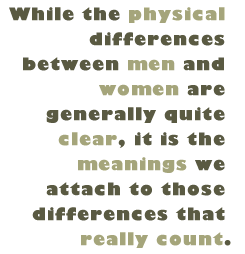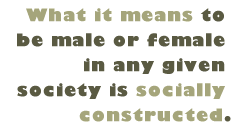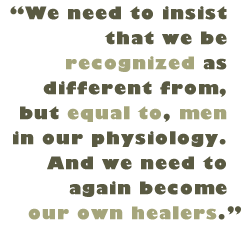Home-Art
329-GS 330-Lit 342-Hum
375-Com 385-GS 410-GS 450,
Research-GS 450, Integration
|
|
|
Written by Jessica Albon |
|
|
|
 ifferences
in gender roles arise from the social values placed on the physical differences between
female and male bodies. This results in the cultural construction of what it means to
be a woman or a man in a given society. Unfortunately, many of these social
constructions have directly disadvantaged women. As a result women suffer from
increased malnutrition, they have less of a voice when it comes to their health and
lose status simply because they are women and not men. This paper will examine the
differences between men and women with regard to nutrition, health and status and then
attempt to determine which of these presents the most serious disadvantage to women. ifferences
in gender roles arise from the social values placed on the physical differences between
female and male bodies. This results in the cultural construction of what it means to
be a woman or a man in a given society. Unfortunately, many of these social
constructions have directly disadvantaged women. As a result women suffer from
increased malnutrition, they have less of a voice when it comes to their health and
lose status simply because they are women and not men. This paper will examine the
differences between men and women with regard to nutrition, health and status and then
attempt to determine which of these presents the most serious disadvantage to women.
|
|
|
Here in the United States, food takes on a similar importance for different reasons. Bonvillain mentions the stereotypical masculine meal of meat and potatoes and also mentions that American women are expected to favor salads (254). Such beliefs seem to have a malevolent intent as Bonvillain points out: "These presumed differences cohere as well with prevailing standards of beauty that have the effect of encouraging women to eat salads and other foods low in calories to avoid gaining weight" (Ibid.). Indeed, with the shocking numbers relating to eating disorders in the United States and with as many as 90% of all victims being female, food and nutrition must be examined in terms of gender in the United States. Certainly, there is more pressure on women to conform to certain physical types than on men. Women see unattainable (and unreal) pictures of the "ideal" female form on the covers of women's magazines, men's magazines and general interest magazines. Even magazines supposedly dedicated to women's health boast these air-brushed, extremely thin models (see the latest issues of SHAPE or Women's Sports and Fitness). Thus, though food is plentiful in the United States, women may feel the need to not eat in order to look like the women they see on magazine covers and on television. When women do not eat, their "self-control" is lauded (see Unit 2's Threaded Newsgroup for evidence), while when men do not eat, they are often told they will get sick. It seems strange that a society that does not withhold food from women finds their women withholding foods from themselves by setting up a structure that encourages such behavior. |
|
|
|
|
|
 long with health
concerns that may not be taken seriously and nutritional discrepancies, women generally
have less status than men. This is illustrated most plainly in language. In English,
women are more likely to speak standard or prestige English, while men speak in the
nonstandard form (Bonvillain, 298). This seems odd upon first analysis as lower-class
speakers use non-standard English while upper-class speakers use prestige or standard
(and if the argument is that women have lower status, it seems they would follow the
lower-class pattern). It makes more sense, however, when one considers that women
likely use standard or prestige English in order to accomplish what men can accomplish
using non-standard English. This means that men can still upgrade their speaking by two
levels while women don't have that flexibility. Women are also more quick to
"upgrade" their speaking and Bonvillain suggests this may be because
"women are more conscious of prestige norms and strive to use them because they
are critically judged by their social self-presentation" (300). Additionally,
according to Muenier, men are more likely to interrupt women, while women do not
interrupt men. This indicates that men do not believe what women say is important, or
that, at least, they believe what they have to say is more important than that which
women may have to say. Additionally, according to Muenier, men often consider the
topics discussed by women to be "trivial." Therefore, they excuse themselves
from participating and may either change the subject or merely stop listening. In one
way, the way that men react to women lessens the status of women, however, one must
also ask whether it is reasonable to determine a woman's status based on whether or not
a man will listen to her. Does it not seem just as reasonable to disregard the opinions
of men and instead allow women to build their status among other women? Women also are
less likely to hold prestigious jobs. They are more likely to be nurses than doctors,
more likely to be secretaries than lawyers (Bonvillain, 179, 260). In this way, also,
women seem to be denied status. long with health
concerns that may not be taken seriously and nutritional discrepancies, women generally
have less status than men. This is illustrated most plainly in language. In English,
women are more likely to speak standard or prestige English, while men speak in the
nonstandard form (Bonvillain, 298). This seems odd upon first analysis as lower-class
speakers use non-standard English while upper-class speakers use prestige or standard
(and if the argument is that women have lower status, it seems they would follow the
lower-class pattern). It makes more sense, however, when one considers that women
likely use standard or prestige English in order to accomplish what men can accomplish
using non-standard English. This means that men can still upgrade their speaking by two
levels while women don't have that flexibility. Women are also more quick to
"upgrade" their speaking and Bonvillain suggests this may be because
"women are more conscious of prestige norms and strive to use them because they
are critically judged by their social self-presentation" (300). Additionally,
according to Muenier, men are more likely to interrupt women, while women do not
interrupt men. This indicates that men do not believe what women say is important, or
that, at least, they believe what they have to say is more important than that which
women may have to say. Additionally, according to Muenier, men often consider the
topics discussed by women to be "trivial." Therefore, they excuse themselves
from participating and may either change the subject or merely stop listening. In one
way, the way that men react to women lessens the status of women, however, one must
also ask whether it is reasonable to determine a woman's status based on whether or not
a man will listen to her. Does it not seem just as reasonable to disregard the opinions
of men and instead allow women to build their status among other women? Women also are
less likely to hold prestigious jobs. They are more likely to be nurses than doctors,
more likely to be secretaries than lawyers (Bonvillain, 179, 260). In this way, also,
women seem to be denied status.
Of these ways that women are disadvantaged, in nutrition, health, and status, it seems the most important is nutrition. While health is nearly as serious, nutrition seems slightly more serious because it has a direct effect on the health of women, while health does not have an effect on nutrition. Indeed, nutrition affects status as well, for a malnourished woman would find her life far more challenging. Nutrition has a further impact on status by way of appearance. Women who are deemed overweight (whether they are or not) are less likely to be hired and less likely to be taken seriously. Therefore, nutrition seems most serious because it directly impacts both of the other disadvantages. In addition, nutrition and the way women feel about it results in many deaths (by way of eating disorders). Women who are malnourished may feed the idea that women are weaker and more prone to disease. Therefore this also gives rise to ideas of women as the "weaker sex"; as individuals who need to be protected and given plenty of time to rest. Nutrition is also most important because it has the most serious consequences. While having a poor doctor may result in prolonged sickness or even death, malnutrition will almost certainly result in prolonged sickness or death. Its consequences are also more important than the consequences of lower status because they speak to the lowest of our human needs according to Maslow's pyramid while status is a higher need. |

|
|

 utritionally,
women suffer, particularly in times of food shortage. Many cultures also subscribe to
rules which dictate that men eat first and women eat the leftovers (Bonvillain, 253).
This seems counterintuitive as women require adequate nutrition in order to reproduce
(which, generally speaking, is a role women in all cultures play), while men do not
have the same concerns. Ellen Rosenberg found in societies where women are allowed only
leftovers while men eat whatever amount they desire, women "'may be weaker,
smaller, more lethargic, more disease prone, and shorter-lived than their
husbands'" (as quoted by Bonvillain, 253). In such societies, women's compromised
health is then used against them to justify a subordinated position. Women are
sometimes also barred from consuming or limited in their consumption of meat (Bonvillain,
253). Bonvillain writes that this may be "symbolic of women's exclusion from these
[herding and hunting] economic roles" (253). According to the Novartis Foundation
for Sustainable Development, "neglect of women's health and nutrition is so
serious in some countries, particularly in Asia, that it even outweighs women's natural
biological tendency to live longer than men" (
utritionally,
women suffer, particularly in times of food shortage. Many cultures also subscribe to
rules which dictate that men eat first and women eat the leftovers (Bonvillain, 253).
This seems counterintuitive as women require adequate nutrition in order to reproduce
(which, generally speaking, is a role women in all cultures play), while men do not
have the same concerns. Ellen Rosenberg found in societies where women are allowed only
leftovers while men eat whatever amount they desire, women "'may be weaker,
smaller, more lethargic, more disease prone, and shorter-lived than their
husbands'" (as quoted by Bonvillain, 253). In such societies, women's compromised
health is then used against them to justify a subordinated position. Women are
sometimes also barred from consuming or limited in their consumption of meat (Bonvillain,
253). Bonvillain writes that this may be "symbolic of women's exclusion from these
[herding and hunting] economic roles" (253). According to the Novartis Foundation
for Sustainable Development, "neglect of women's health and nutrition is so
serious in some countries, particularly in Asia, that it even outweighs women's natural
biological tendency to live longer than men" (

